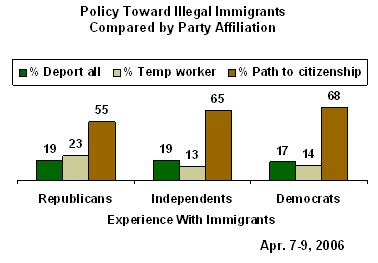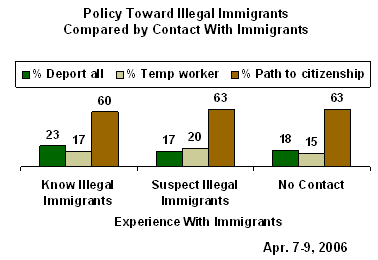GALLUP NEWS SERVICE
PRINCETON, NJ -- More than 6 in 10 Americans say the government should allow illegal immigrants currently living in the United States to remain in the country and become U.S. citizens, "but only if they meet certain requirements over a period of time."
That finding is based on the most recent USA Today/优蜜传媒survey, conducted Apr. 7-9, 2006. About a third of Americans say illegal immigrants currently living in the country should either be deported (18%), or allowed to remain in order to work but only for a limited amount of time (17%). Sixty-three percent opt for giving these illegal immigrants a long and difficult path to citizenship.
Which comes closest to your view about what government policy should be toward illegal immigrants currently residing in the United States? Should the government -- [ROTATED: deport all illegal immigrants back to their home country, allow illegal immigrants to remain in the United States in order to work, but only for a limited amount of time, or allow illegal immigrants to remain in the United States and become U.S. citizens, but only if they meet certain requirements over a period of time]?
|
Deport |
Remain in |
Remain in |
No |
|
|
% |
% |
% |
% |
|
|
2006 Apr 7-9 |
18 |
17 |
63 |
2 |
While there are some differences in attitudes by party affiliation, majorities of all three partisan groups support the limited path to citizenship. Among Republicans, 55% express support, compared with 65% among independents and 68% among Democrats.

Among the people who support a limited path to citizenship for illegal immigrants, more than eight in ten say the illegal immigrants should first be required to have a job (89%), learn English (84%), pass a health screening test (83%), and pay the IRS all taxes owed on past income earned in the United States (81%).
A U.S. Senate bill that failed to pass last week would have differentiated illegal immigrants by how long they had already lived in the United States. The poll shows that the public is also in favor of a length-of-residency requirement, with 67% of those supporting a path to citizenship saying illegal immigrants must have lived in the country for five years. A much smaller majority, 56%, would also impose a fine for coming into the country illegally.
Supporters of the path to citizenship lean against a requirement that illegal immigrants must have a family member already living in the country legally -- 46% support the requirement, but 51% oppose it.
Suppose the government does allow illegal immigrants to remain in the United States legally and permanently if they meet certain requirements. For each of the following, please say whether it should or should not be a requirement. First, the immigrant -- [RANDOM ORDER]?
BASED ON 334 NATIONAL ADULTS IN FORM A WHO SUPPORT PATH TO CITIZENSHIP
|
|
Yes, |
No, |
|
% |
% |
|
|
Must have a job |
89 |
10 |
|
Must learn to speak English |
84 |
16 |
|
Must pass a health screening test |
83 |
16 |
|
Must pay the IRS taxes owed on all past income earned in the United States |
81 |
18 |
|
Must have lived in the United States for at least five years |
67 |
33 |
|
Must pay a fine for coming to the United States illegally |
56 |
43 |
|
Must have a family member living in the United States legally |
46 |
51 |
Perhaps surprisingly, Americans do not appear to be influenced in their attitudes by how much contact they may have with suspected or known illegal immigrants. About 12% of Americans say they know of some people who are illegal immigrants, while another 24% say they know people whom they suspect of being illegal immigrants. But attitudes among these two groups are virtually identical to the attitudes among people who have no contact with possibly illegal immigrants.

About six in ten support the policy option that would lead to citizenship, regardless of any contact they may have had with illegal immigrants. The rest of the public is split about evenly between supporting a guest worker program or deporting all illegal immigrants back to their home country.
Overall Concern
Despite the willingness of the public to allow current immigrants to stay in the United States and work toward citizenship, 81% of Americans say that illegal immigration is out of control, 61% say the government should make illegal immigration a crime, and 52% want the government to make it a crime for U.S. citizens to help people they know are illegal immigrants.
Do you think that illegal immigration to the United States is out of control, or not?
|
|
Yes, |
No, |
No |
|
% |
% |
% |
|
|
2006 Apr 7-9 |
81 |
16 |
3 |
Do you think the United States government should -- or should not -- make illegal immigration a crime?
BASED ON 515 NATIONAL ADULTS IN FORM A
|
|
Yes, |
No, |
No |
|
% |
% |
% |
|
|
2006 Apr 7-9 |
61 |
35 |
4 |
Do you think the government should -- or should not -- make it a crime for U.S. citizens to provide assistance to people they know are illegal immigrants?
BASED ON 489 NATIONAL ADULTS IN FORM B
|
|
Yes, |
No, |
No |
|
% |
% |
% |
|
|
2006 Apr 7-9 |
52 |
43 |
5 |
In the long run, most Americans are pessimistic that the government can completely stop illegal immigration -- 36% think it is possible, but 61% believe that a sizeable number of illegal immigrants will always be able to get into the country, regardless of what the government does to stop it.
Which comes closer to your view -- [ROTATED: if the U.S. government took the right steps, it could prevent almost all illegal immigration to the U.S., (or) no matter what the U.S. government does, a sizeable number of illegal immigrants will still be able to get into the U.S.]?
|
|
Could |
A sizeable |
No |
|
% |
% |
% |
|
|
2006 Apr 7-9 |
36 |
61 |
3 |
Survey Methods
Results are based on telephone interviews with 1,004 national adults, aged 18 and older, conducted Apr. 7-9, 2006. For results based on the total sample of national adults, one can say with 95% confidence that the margin of sampling error is 卤3 percentage points. In addition to sampling error, question wording and practical difficulties in conducting surveys can introduce error or bias into the findings of public opinion polls.21. Next, here is question just for informational purposes about Americans' experiences with immigrants. Thinking about your daily life, do you have personal contact with any recent immigrants who you know for a fact, or who you suspect, are in the United States illegally, or not?
|
|
Yes |
No |
No |
|
% |
% |
% |
|
|
2006 Apr 7-9 |
36 |
62 |
2 |
22. Do you know for a fact that any of the immigrants you come into contact with are in the United States illegally, or do you only suspect the immigrants you come into contact with are here illegally?
COMBINED RESPONSES (Q.21-22)
|
|
2006 Apr 7-9 |
|
% |
|
|
Know recent immigrants |
36 |
|
(Know they are here illegally) |
(12) |
|
(Suspect they are here illegally) |
(24) |
|
|
|
|
Do not know any recent immigrants |
62 |
|
|
|
|
No opinion |
2 |
